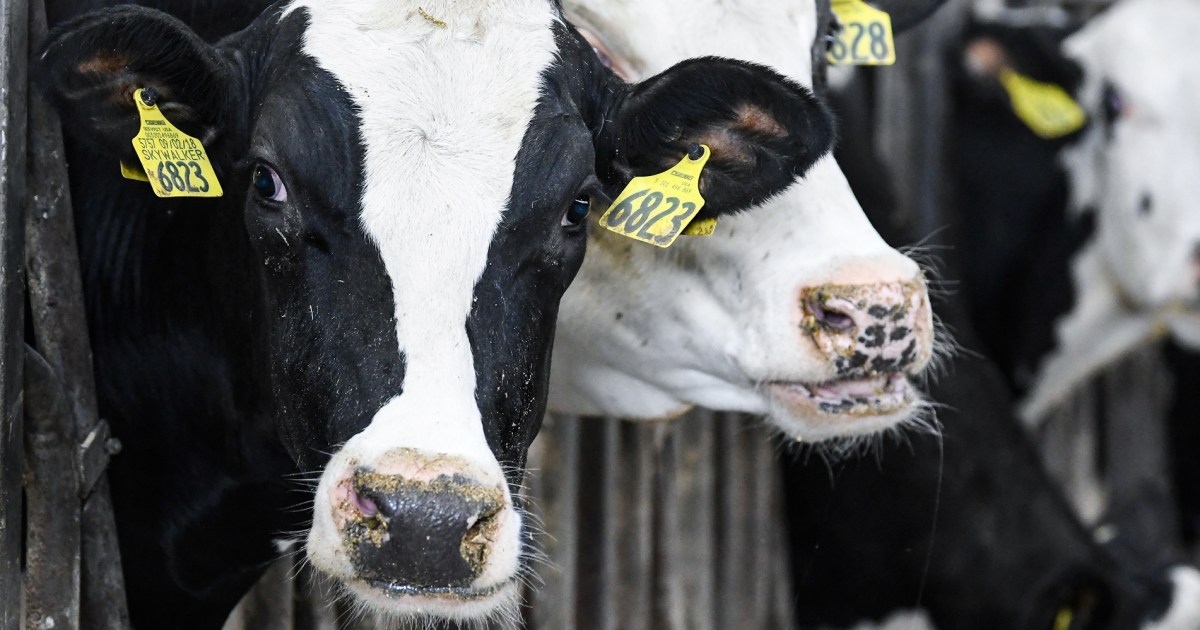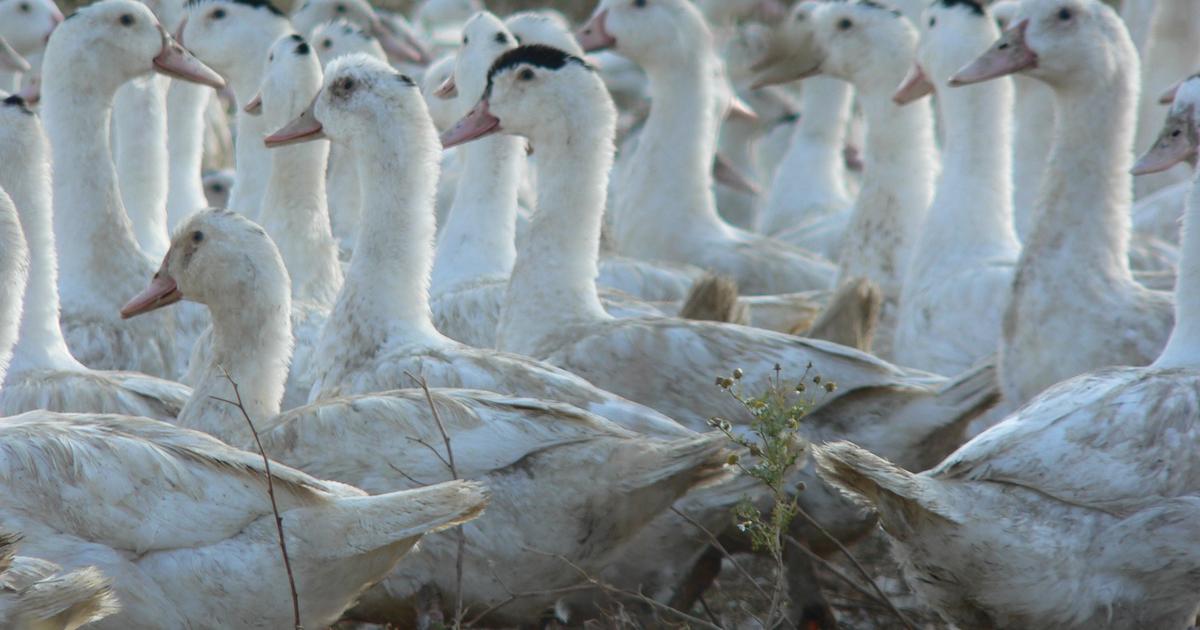Meat entrepreneur Clemens Tönnies
Photo: Noah Wedel / imago imagesGermany had the corona virus under control again, but then the corona outbreak at the Tönnies meat company in June caused the number of cases reported to rise rapidly: Within a very short time, more than 1,400 workers were infected and two districts had to go into lockdown again. The infections at the controversial company in Rheda-Wiedenbrück are the world's largest documented corona outbreak in a meat factory.
The culprit was quickly found: Tönnies himself - the company that has upscaled the Germans' appetite for sausage and steak to a mass business. The industry leader processes around 16.7 million animals per year - and slaughters more than its two largest competitors Westfleisch and Vion combined. CEO Clemens Tönnies is also well suited to the image of the enemy: his proximity to Russia, accusations of racism - and in general: Can someone who slaughter up to 25,000 animals a day and lets Eastern European subcontractors work for them under dubious conditions be innocent?
Despite violent reactions from politics, society and the media, Tönnies claims exactly that - and sees himself finally relieved by a study. The investigation appeared on July 23, there was talk of a superspreader event, one result was that workers eight meters away had also been infected with corona. According to the information, the study was not externally funded or commissioned.
SPIEGEL has now taken a closer look at the results of the research team led by Melanie Brinkmann from the TU Braunschweig and the Helmholtz Center for Infection Research. At first glance, Tönnies is right - he and his company can hardly be blamed for the first infections. But that's only part of the truth.
Tönnies employees now work separated from each other by Plexiglas panes
Photo: Tönnies / DPAThe origin
Initially, the trail to the origin of the outbreak does not lead directly to Tönnies, but to a sausage factory in Dissen in Lower Saxony called Westcrown, which is a good 30 kilometers away from the Tönnies factory.
At Westcrown, 94 out of 279 employees tested positive at the beginning of May after mass tests were ordered in all major meat operations in North Rhine-Westphalia. Two Tönnies employees who dismantle cattle districts in the early shift at the plant in Rheda-Wiedenbrück then told their superiors that they had attended a church service with colleagues from Dissen. Because the risk of infection was considered to be low, the men continued to work while they waited for their test results. It was positive.
According to the first results, only one of the two Tönnies employees passed the virus on, the researchers call it B1. Genome analyzes of the viruses he was carrying showed certain mutations that were later discovered in his colleagues. In this way, infection routes can be traced.
The first outbreak
The two infected Tönnies employees and five colleagues from the same apartment went into quarantine. However, the move came too late. B1 had already passed the virus on, and tests on 18 of the 140 early shift employees gave a positive result.
The workers had worked together in a large production chain in which quartered cattle came in on one side and came out as pre-packaged pieces of meat at the other end. Most of the employees had their fixed place, B1 was right in the middle of the hall.
Tönnies plant in Rheda-Wiedenbrück: The early shift went into quarantine first
Photo: Christoph Hardt / imago images / Future ImageThe researchers conclude that the virus spread mainly through tiny infectious air particles, so-called aerosols, which can stay in the air for a long time. In meat cutting, cooling systems constantly suck in air in order to keep the room temperature at ten degrees Celsius. The systems probably act like a virus carousel that hurls the infectious particles through the air.
B1 presumably infected colleagues eight meters away from him. Which means that a distance of one and a half or two meters, which is considered relatively safe under other circumstances, may not be enough in slaughterhouses. That could explain the many other outbreaks in meat and fish factories around the world. (Here you can read more about it.)
"Our data strongly suggest that the majority of transmissions occurred within beef processing, with Case B1 being the origin of the cluster," the researchers write in their first report, which has not yet been peer-reviewed. Housing conditions, on the other hand, apparently hardly played a role. The infection rate was noticeably increased in only one out of eleven apartments examined and one out of nine car pools that used the early shift. However, those affected had also worked closely together.
The supposed indulgence
"We cannot rule out that individual transmissions have also occurred in communal accommodations," Brinkmann told SPIEGEL. "But you alone can never explain an outbreak at such a speed." Tönnies was always cooperative and answered all questions, including "who worked where, who was in a car with whom".
This result is entirely in the interests of the company. "With this study it is now clear that the outbreak in Rheda-Wiedenbrück was not our fault," said a message to SPIEGEL. "Neither the lack of hygiene measures nor the living conditions of the contract workers were responsible. The outbreak did not occur because laws, rules or regulations were violated. A problem simply arose that no one knew about before."
Whether the study is a first-rate acquittal for Tönnies is by no means as clear as the company apparently would like. Because the researchers only examined a first cluster.
The big outbreak followed a good month later.
This time the virus circulated among employees in the sow cutting department, 657 of 983 samples from the department were positive. Authorities pulled the emergency brake, schools and daycare centers were closed, the slaughterhouse in Rheda-Wiedenbrück closed. On June 23, the districts of Gütersloh and Warendorf had to go back into lockdown.
In this outbreak, too, many of the infected people carried the virus variant that had previously been found in the B1 cattle butcher. According to the research team around Brinkmann, this indicates a persistent infection process that can be traced back to an origin.
Test center in the Tönnies factory: Superspreader also for sow cutting?
Photo: Guido Kirchner / DPATönnies explains this with further rounds in the virus carousel. Gereon Schulze Althoff, head of the pandemic crisis team at Tönnies, says: "There could have been individual infections inside and outside of the company. Of these, people in pork butchering could have caused superspreading events comparable to those of the first outbreak in cattle-cutting. "
You could not tell at the time because many cases were symptom-free and no employee had reported as a possible contact person for an infected person. Tönnies was "deeply disappointed" about the unsuccessful containment, says Schulze Althoff, but they were also simply "unlucky" because the infectious workers "obviously [...] didn't know they were infected".
According to the Helmholtz study, aerosol transmission may have played a role in this outbreak as well, but the virus must have somehow got into the pig area. In their conclusion, the researchers therefore explicitly point out that the living conditions could have played a role in this second, larger outbreak. The alleged indulgence that Tönnies now refers to - clearly proven by science - is therefore questionable.
The question of guilt
The Bielefeld public prosecutor's office has already received around 50 criminal charges in connection with the corona outbreak. The authority is now also investigating the management of Tönnies. There is an initial suspicion of negligent bodily harm and violation of the Infection Protection Act.
The fact that Tönnies sees himself relieved by the study is also a positioning in the investigation for lawyer Michael Winkelmüller, who specializes in occupational, environmental and health protection. "Tönnies' statement reads as if it had the causality of possible breaches of duty in mind," says Winkelmüller. What he means: Tönnies will doubt that the corona infections of employees can be traced back to possible misconduct by the company. Because the group threatens sensitive claims for damages.
In principle, the employer has a duty of protection and care, which means that he must protect the life and health of his employees from dangers in the workplace. To do this, he must comply with the health and safety at work law and the respective corona protection ordinance of the country - and presumably also the "SARS-CoV-2 health and safety standard", which Minister Heil published in April. This advises, for example, not only to introduce a mask requirement, but also to put up plastic walls if employees cannot keep the minimum distance of 1.5 meters. Several employees should also not sleep in one room.
The problem for the Tönnies workers: Most of them are employed in subcontractors, so they could only prosecute their direct employer for violations of occupational health and safety and infection protection - or would have to prove that Tönnies, as a de facto employer, has a duty of protection and care. That shouldn't be easy.
In addition, according to lawyer Winkelmüller, Tönnies could argue that any violations had no effect on the corona outbreak in the factory. "That would be a relief for those responsible at Tönnies in criminal proceedings and also in civil liability proceedings," says the lawyer. Then there would probably be no threat of conviction for negligent bodily harm or negligent breach of duty, but rather a simple fine.
The blueprint
But Tönnies could also be prosecuted in other ways. Thus, contrary to the rule, the massive infections could be rated as work-related accidents - the statutory accident insurance could then cover the treatment costs and claim recourse against Tönnies or his subcontractors. In the meantime, the umbrella association of the accident insurance funds DGUV is also open to this possibility if the person concerned has been in contact with an infected person for a long time or if there is an "outbreak" in the company.
According to Winkelmüller, contract workers have the best chance of getting compensation from "tortious acts". The hurdles for this are "high, but not absolutely insurmountable". Specifically, the workers could accuse Tönnies of "immoral willful damage". In order to be able to argue in this way, according to Winkelmüller, violations of the minimum distance, the mask requirement or the accommodation must already have occurred frequently and systematically.
Tönnies announced that occupational safety measures "must be followed very clearly". "We are still of the opinion today that our hygiene concept from before the corona outbreak was basically suitable. The authorities were also aware of this hygiene concept."
In the meantime, 15,000 animals are slaughtered again in the plant every day. According to the company, it was up to 25,000 before Corona. The hygiene concept has been tightened, a new filter technology has been installed and Plexiglass panes stand between the workers.
Tönnies, of all people, could now become a blueprint for dealing with Covid-19 in meat processing companies. A request from a North American authority that asked for information about the new ventilation system has only just been received, says spokesman Markus Eicher. Tönnies is also in contact with one of the largest US producers.
Crisis team leader Schulze Althoff is certain that "important conclusions for global outbreaks" can be drawn from the new findings. It remains to be seen whether the virus agrees with them.
Icon: The mirror







